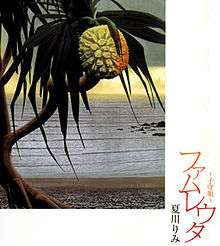Famureuta
Famureuta (ファムレウタ~子守唄~, Yaeyama: Fāmurēuta "lullaby") is Rimi Natsukawa's second EP, released on October 22, 2003.[1] It consists solely of recordings on lullabies. It is her second EP that solely features cover songs.
| Famureuta | ||||
|---|---|---|---|---|
 | ||||
| EP by | ||||
| Released | October 22, 2003 | |||
| Recorded | 2003 | |||
| Genre | J-pop, Shima uta, traditional | |||
| Length | 29:58 | |||
| Label | Victor Entertainment | |||
| Rimi Natsukawa chronology | ||||
| ||||
| Singles from Famureuta | ||||
| ||||
Background
The title comes from the song "Famureuta" (ファムレウタ(子守唄), Lullaby), which featured on Natsukawa's debut album "Tida: Tida Kaji nu Umui." The album was preceded with the single "Warabigami (Yamatoguchi)" (童神~ヤマトグチ~, Little God), a standard Japanese version of the Misako Koja song she covered on her 2002 EP "Minamikaze." "Famureuta" featured as the B-side of this single. The version of "Warabigami" appearing on the single is not on the album, however, a re-arranged duet version with Misako Koja appears instead.
Song sources
The songs are lullabies from around Asia. "Warabigami" and "Famureuta" are songs released by Okinawan musicians (Misako Koja, Parsha Club). Two are lullabies from other regions of Japan ("Chūgoku Chihō no Komoriuta," "Shimabara no Komoriuta"). The Chūgoku one is traditional, while the Shimabara one was written by Kohei Miyazaki in the 1950s (an popularised by enka singer Chiyoko Shimakura).
"Māmāhō" is a cover of "Mama Hao (媽媽好 Mama's the Best)," a song sung by Josephine Siao in the 1960 Chinese film Ku Er Liu Lang Ji (苦兒流浪記). "Ten no Komoriuta" is a cover of Mongolian singer Oyunaa's debut Japanese single of the same name, released in 1990. "Chājanga" is a cover of Jajangga (자장가 Lullaby), a traditional Korean lullaby.
Track listing
All songs arranged by Seiichi Kyōda.
| No. | Title | Lyrics | Music | Length |
|---|---|---|---|---|
| 1. | "Warabigami (Tida Chichi Version) (童神~太陽・月バージョン~, Little God (Sun, Moon Version))" (with Misako Koja) | Koja | Kazuya Sahara | 4:46 |
| 2. | "Chūgoku Chihō no Komoriuta (中国地方の子守歌, Chūgoku Region Lullaby)" | Traditional | Kosaku Yamada | 3:32 |
| 3. | "Māmāhō (マーマーホー, Mama's the Best)" | Li Jun Qing, Eiko Kyo (Japanese translation) | Liu Hong Yuan | 3:21 |
| 4. | "Ten no Komoriuta (天の子守歌, Sky Lullaby)" | Erudenechiechegu, Kōnosuke Fuji (Japanese translation) | Oyunaa | 5:04 |
| 5. | "Shimabara no Komoriuta (島原の子守歌, Shimabara Lullaby)" | Kohei Miyazaki | Miyazaki | 4:06 |
| 6. | "Chājanga (チャーヂャンガ, Lullaby)" | Mwun Hye Ji | Traditional | 4:52 |
| 7. | "Famureuta (子守唄, Lullaby)" | Yukito Ara | Masaaki Uechi | 4:17 |
Japan sales rankings
| Release | Chart | Peak position | First week sales | Sales total |
|---|---|---|---|---|
| October 22, 2003 | Oricon Weekly Albums Chart[2] | 25 | 9,535 | 44,783 |
References
- "夏川りみ オフィシャルサイト". Archived from the original on 2009-02-28. Retrieved 2010-01-29.
- "オリコンランキング情報サービス「you大樹」". Oricon. Retrieved 2010-01-29. (subscription only)